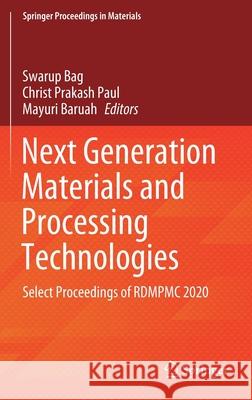Next Generation Materials and Processing Technologies: Select Proceedings of Rdmpmc 2020 » książka



Next Generation Materials and Processing Technologies: Select Proceedings of Rdmpmc 2020
ISBN-13: 9789811601811 / Angielski / Twarda / 2021 / 600 str.
Next Generation Materials and Processing Technologies: Select Proceedings of Rdmpmc 2020
ISBN-13: 9789811601811 / Angielski / Twarda / 2021 / 600 str.
(netto: 576,41 VAT: 5%)
Najniższa cena z 30 dni: 578,30
ok. 16-18 dni roboczych.
Darmowa dostawa!
Development of High Strength Low Carbon Lean Microalloyed Steel with Optimized Toughness.- The Pros and cons of an energy-efficient Q&P approach to develop advanced steels.- Ductility improvement of commercially pure Aluminium through Friction Stir Processing.- Development of composites using bamboo waste and polymers for industrial application.- Design and Analysis of membrane based Parabolic Space Reflector.- Development of Gearbox for the Integration of Paddle Wheel and Propeller Aspirator Aerators for Shrimp Farming.- Experimental Investigation of 2024 Aluminum Alloy Joints by Underwater Friction Stir Welding for Different Tool Profile.- Performance Evaluation of Spiral Separator for Coal Cleaning using Mixture Model.- Mixing Performance Analysis of Serpentine Microchannels with Straight and Curved Bends.- Comparison of different models to estimate the best solar global radiation for Jamshedpur, Jharkhand, India.- A study of micro-structure and mechanical properties of wire arc additive manufactured component with ER70S6 alloy wire using CMT process.- Effect of MoS2 and CeO2 powder addition by friction stir processing on wear and corrosion properties of Al7075 alloy.- Effect of Current Pulsation on Weld Microstructure during Micro-Plasma Arc Welding of Inconel 718.- Effect on microstructure and mechanical property of 4043 wire arc additive manufactured aluminum alloy with different process parameters.- Influence of WEDM Parameters for Estimating the Surface Integrity of Laser Additive Manufactured Hybrid Material.
1997-2026 DolnySlask.com Agencja Internetowa
KrainaKsiazek.PL - Księgarnia Internetowa









